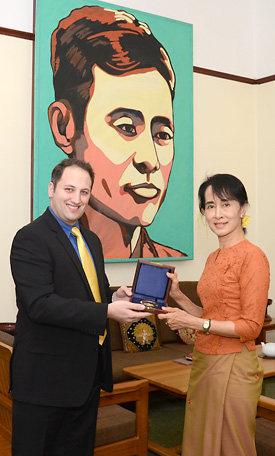Dominic Nardi got stopped at the airport during his first trip to Burma as a tourist 11 years ago. Customs agents tried to seize a book from him because the cover had a small picture of Aung San Suu Kyi, a dissident and Nobel Peace Prize winner reviled by the country’s repressive leaders.
When Nardi returned to Burma over the recent winter break, he didn’t bring any pictures of Suu Kyi. But the graduate student in political science still was interested in the dissident, and he planned to do something that would have been unimaginable just a year or so ago: meet with her in her home — the same place she spent most of the past two decades under house arrest.

Dominic Nardi, U-M graduate student in political science, presents the Wallenberg Medal to Aung San Suu Kyi in her home in Yangoon. Photo courtesy Dominic Nardi.
Nardi was on a special mission for U-M to deliver the Wallenberg Medal to Suu Kyi. The humanitarian award is named after a U-M alumnus who saved tens of thousands of Jews near the end of World War II. Past recipients include the Dalai Lama and Archbishop Desmond Tutu.
When Suu Kyi was given the Wallenberg last year, she could not attend the ceremony in Ann Arbor because she feared if she left Burma, the government wouldn’t allow her to return. She wanted to continue her peaceful struggle for democracy and human rights inside her Southeast Asian homeland.
Nardi was one of the best candidates to deliver the Wallenberg medal to Suu Kyi because Burma, also known as Myanmar, is one of his research interests. On his first trip to the country, he fell in love with the land and its people and has gone back nearly every year for the past decade.
“The people I met were extraordinarily kind, very generous,” he says.
He also has a personal connection with Suu Kyi. His wife, whom he met when they were both studying at Georgetown University, is Burmese, and her grandfather served as a young bodyguard to the dissident’s father in the 1940s. His duties included occasional stints as a babysitter for Suu Kyi when she was a toddler.
The grandfather reconnected with Suu Kyi 40 years later. He joined her political party and was elected as a member of parliament in the 1990 election, which later was nullified by the regime.
Suu Kyi’s father, Aung San, led the battle against British colonial rule and is widely regarded to be the father of modern Burma. He was assassinated when Suu Kyi was 2 years old.
For the past half century, the Burmese have suffered under brutal military rule. But when Nardi traveled to the country in December, it was undergoing what many hope will be a deep political thaw. The military appeared to be relaxing its grip, releasing Suu Kyi and scores of other political prisoners.
“It was really shocking,” says Nardi, describing the changes he witnessed.
Nardi says that before he set off for his appointment with Suu Kyi, his wife asked him to go to the market to buy a picture of the Nobel laureate for an autograph. Recalling how Suu Kyi’s image had been banned for so long, Nardi thought he was being sent on a fool’s errand.
“I remember thinking, ‘How in the heck am I going to get a photograph?’” he says.
To his amazement, the photos were virtually everywhere: street stalls, billboards, calendars, magazine shelves in supermarkets.
“This definitely reveals that she’s now more popular, more of a celebrity, more respected than ever before,” he says.
A steady parade of journalists and foreign dignitaries — including U.S. Secretary of State Hillary Clinton — has visited Suu Kyi in recent weeks. Nardi says he had to wait on a bench outside a reception room in her home as she finished an interview with a TV crew.
When he finally got to meet Suu Kyi, he was most struck by how personable she was. “She comes across as a real person,” he says, “not a human rights icon.”
During the 30-minute meeting, they discussed the history of the Wallenberg Medal and chatted about their lives and interests.
Nardi asked Suu Kyi if he could do something that might seem unusual in American culture. He asked her if he could perform a “kadaw”: kneeling down before her and touching his forehead to the ground three times while she says a prayer for him. It’s a common way to show respect to elders in Burma, and Suu Kyi gladly accepted his kadaw.
Some Burma watchers have been careful about assessing the apparent signs of reform, noting that the government has relaxed its grip before only to tighten it again.
But Nardi believes the current wave of reforms is definitely different from past periods. He thinks the changes are unprecedented and unlikely to be easily reversed.
“After 50 years of being in the desert,” he says, “there are signs of water.”

